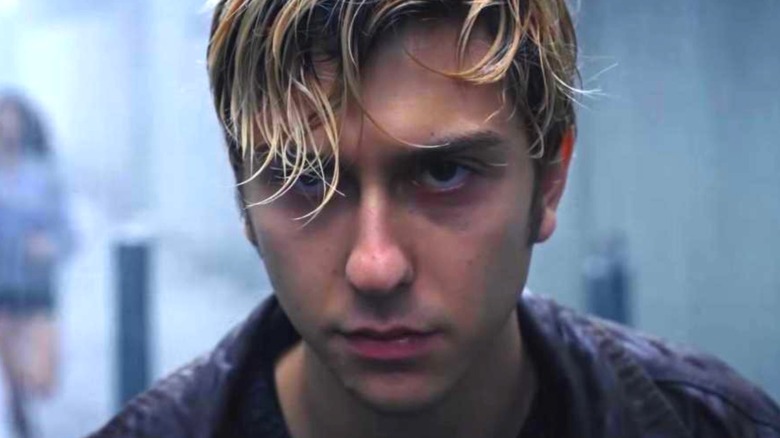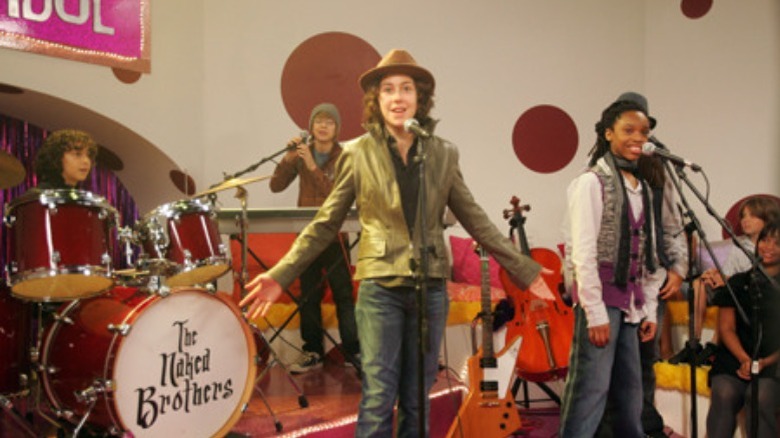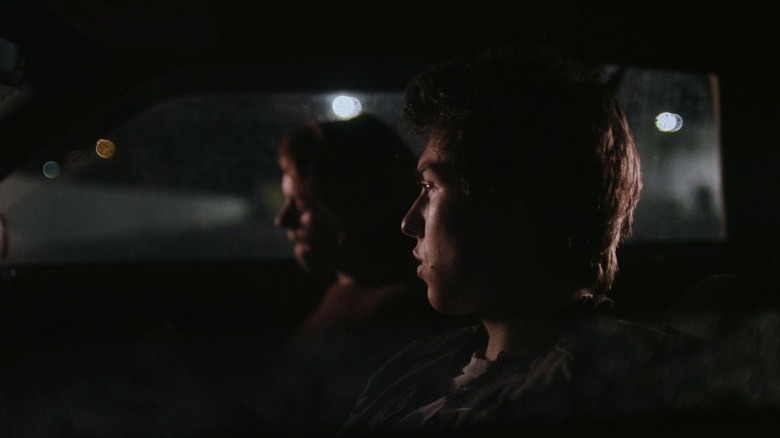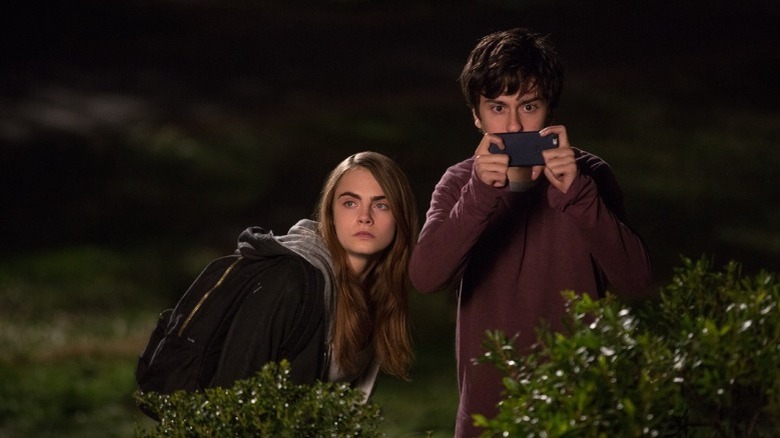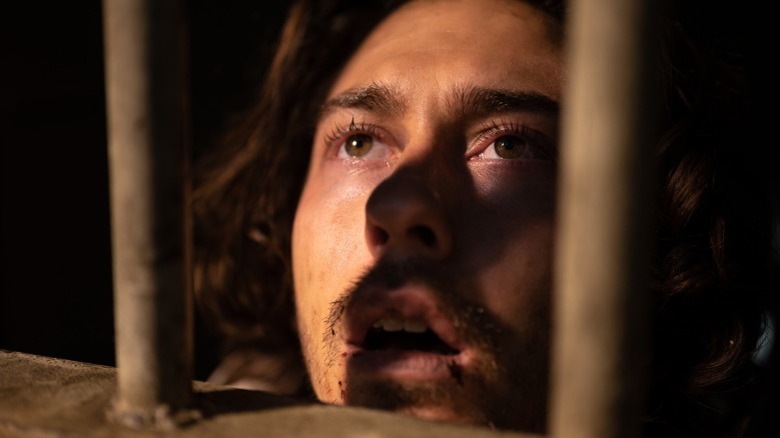Why Light Turner From Death Note Looks So Familiar
There was a time when Adam Wingard looked all set to be the big critical darling of his generation of horror filmmakers. But, since 2016, he has embarked on a much different route than early indie hits "You're Next" and "The Guest" seemed to prefigure, embracing big-budget franchise endeavors that left some fans wondering whether he'd "sold out."
That hasn't stopped many of those fans, however, from finding traces of brilliance even amid the commercial constraints of Wingard's last few projects. Some have argued that he's a kind of "vulgar auteur" operating in plain sight, whose attempts to subvert the usual expectations of blockbuster horror from the inside out have been misunderstood by viewers. And the most infamous example of that is "Death Note," his Netflix live-action take on the eponymous manga series. Originally reviled by critics and OG "Death Note" fans for its abrasive excess and utter unfaithfulness to the source material, the film has since undergone a minor re-evaluation in certain circles, with some arguing that Wingard knew exactly what he was doing when he made the movie so brash and ridiculous.
Particularly favored by this reappraisal has been the performance at the movie's center, which casts protagonist Light Yagami — now renamed Light Turner — in such a campy, melodramatic light that makes for borderline mockery. Whether or not you think actor Nat Wolff was "in on the joke," you might have found yourself wondering where else you know him from. Here are a few possible answers.
Nat Wolff had his own life fictionalized on The Naked Brothers Band
The son of a jazz pianist and an actress-slash-filmmaker, Nat Wolff was in a uniquely ideal position to have his adolescence made into a TV show about a teen rock band. Having taken up music at an early age and spent the better part of his childhood insisting he wanted to be a child actor (via Boston.com), he finally began to act in his mother Polly Draper's projects, which led to him starring in "The Naked Brothers Band," a 2005 mockumentary comedy about a fictional band made up of Nat and his brother Alex Wolff, featuring songs written by Nat himself. The film was picked up by Nickelodeon as the pilot to a TV show, and the rest is history.
Across three seasons and 37 episodes, the lives of the fictionalized Wolff brothers and their bandmates were "mockumented" to great success, with their mother on hand as showrunner and their father Michael Wolff playing their father. "The Naked Brothers Band" was one of the biggest live-action hits of 2000s-era Nickelodeon, and, in an instance of life imitating art, the titular band actually became a thing in real life, thanks to a couple of soundtrack albums that managed to chart in the Top 30 of the Billboard 200.
As Wolff explained to Time Out New York in 2009, "Having our life turned into a mockumentary wasn't as big a deal as some would think. We took all the friendships, Alex's one liners, and my music and put it into a storyline; it was a heightened reality."
Nat Wolff drew raves for his supporting turn in Palo Alto
After "The Naked Brothers Band" ended in 2009, Nat Wolff appeared in a series of films throughout the early 2010s, including "New Year's Eve," "Peace, Love & Misunderstanding," and "Stuck in Love." His most notable role of this period was in "Palo Alto," a Gia Coppola-directed drama film about the ennui-filled lives of teenagers in the titular California city.
Even though it was centered on April (Emma Roberts), "Palo Alto" largely pivoted on the character of Fred, the loose-cannon best friend of April's crush Teddy (Jack Kilmer). Introduced by slamming his car into a wall for fun, Fred was the most extreme result of the boredom and directionlessness that plagued the film's entire milieu — an entitled, out-of-control jerk who would stop at absolutely nothing to feel something. His increasingly reckless and sociopathic actions gave "Palo Alto" much of its dramatic thrust, and Wolff's unhinged performance in the role drew near-unanimous praise from critics, with Empire arguing he "burns a hole in the screen." He even got awards attention, earning a Best Supporting Actor nomination in the International Online Cinema "Halfway Award" honoring the best films of the first half of 2014 (via IMDb).
He earned newfound mainstream visibility in two John Green adaptations
By 2014, Nat Wolff had decisively grown out of his child-star years and was beginning to become equally or more visible for his young-adult projects. This was confirmed by his supporting performance in the worldwide hit teen drama "The Fault in Our Stars," in which he was third-billed as Isaac, the best friend of co-protagonist Augustus Waters (Ansel Elgort).
His endearing, delightful work as the unflinchingly good-humored Isaac, who cracked jokes even as he suffered through the pain of retinoblastoma, made him an instant breakout star along with Elgort and Shailene Woodley. It came as no surprise at all when he was cast as the lead, Quentin Jacobsen, in the next high-profile John Green adaptation, 2016's "Paper Towns."
Though the scavenger-hunt mystery film wasn't quite as much of a smash hit as "The Fault in Our Stars," it still made a splash among teen audiences, particularly due to the chemistry between Wolff and co-star Cara Delevingne. The one-two punch of "The Fault in Our Stars" and "Paper Towns" made Nat Wolff a household name and confirmed him as a new Hollywood leading man in the making.
He was a highlight in the star-studded cast of post-apocalyptic miniseries The Stand
Developed by Josh Boone (who directed Nat Wolff in "Stuck in Love") and Benjamin Cavell from a novel by Stephen King, 2020's "The Stand" was the first high-profile stab at the increasingly popular limited series format on CBS's streaming platform CBS All Access (since renamed Paramount+). It's one of the biggest roles Nat Wolff has nabbed since his controversial performance in "Death Note" in 2017.
Following a plague-ridden post-apocalyptic world in which the few remaining survivors are torn between the benevolent Mother Abagail (Whoopi Goldberg) and the dreadful Randall Flagg (Alexander Skarsgård) in an epic battle for the fate of humanity, "The Stand" painted an elemental story of good vs. evil across a wide blockbuster canvas. Despite the high production values and star-studded cast, the reception was mixed — save for a few elements consistently singled out for praise. One of those was the performance of Nat Wolff, who played evil henchman and convicted mass murderer Lloyd Henreid; The A.V. Club deemed his "brazen take" on the character an "an unexpected delight," and RogerEbert.com praised his dedication to the role, calling him "incredibly game."
